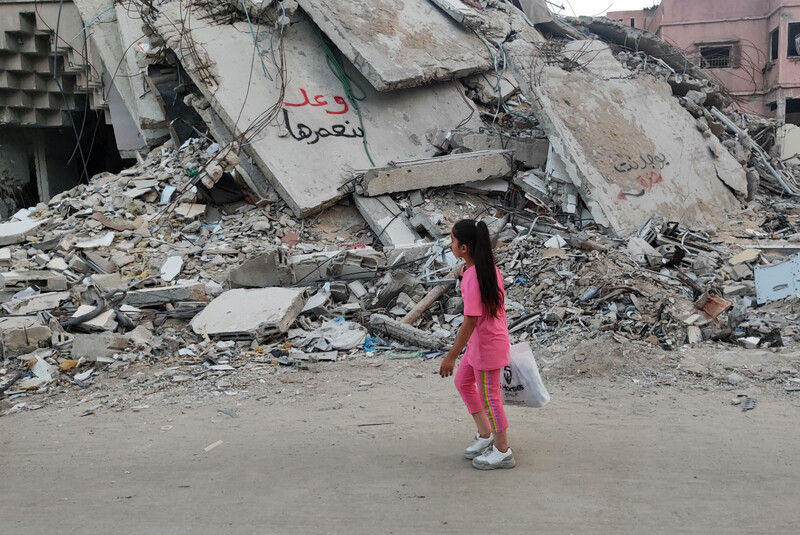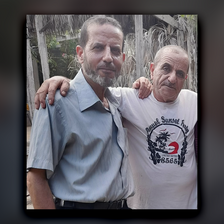The Electronic Intifada 30 May 2024

Graffiti reading “we will rebuild” in Gaza City.
APA imagesWhere will we go?
What should we take with us this time?
Will our home still be standing?
Will we be able to come back?
How many times will we have to evacuate?
Eight, nine, 10 or 100 times?
How long will it take to get used to a new place?
Will our new place be safe?
How does one compress a lifetime’s memories into a single bag?
These are the questions which have been roaring inside my head for months.
My family have been forced to evacuate several times since the current war began.
The first evacuation occurred in mid-October. We received an order from the Israeli military to leave Gaza City and head southwards.
The northern part of Gaza, including Gaza City, was deemed too dangerous.
Hastily, we gathered essential documents, leaving cherished possessions and memories behind.
We sought shelter in Nuseirat refugee camp, central Gaza, for three harrowing months. During that time, we endured repeated bombings.
It wasn’t until a month after our evacuation from Gaza City that we learned our home had been destroyed.
We lost our jobs, too, because of this war.
And our problems were exacerbated by the lack of access to clean water, medicine, electricity and the internet.
Numerous members of my family had to share the same cramped living quarters. Even basic necessities such as using the bathroom required long waits.
Our daily existence became a struggle for survival. Something as simple as a shower with clean water became a distant luxury.
Despair
As the situation worsened, Israel issued further evacuation warnings, plunging us into despair.
The prospect of relocating – especially with young children – filled me with dread.
Thanks to the perseverance of my father, we have found temporary accommodation in Deir al-Balah, central Gaza.
I can only hope that our next destination will be Gaza City. It is the only place where I want to go.
Jamal, my father, is 59. He argues that the current war “feels like a new Nakba” – referring to the ethnic cleansing of Palestine between 1947 and 1949.
My grandfather – Jamal’s father – was expelled from Majdal in historic Palestine during the Nakba.
“They expected a brief displacement,” Jamal said. “But it stretched into years.”
Similarly, Jamal never imagined that the current war would last so long.
“The uncertainty of when this new Nakba will end weighs heavily on us,” he said.
“Leaving my home is a mistake I deeply regret,” he added.
“I know it was too dangerous to stay. But since leaving it, I have never felt safe.”
Through being displaced, Jamal has gained a new insight into the pain and longing of his own father.
“Now I know why my father spoke about his homeland all the time,” Jamal said. “If I could have one wish, it would be to go back to Gaza City at this very moment.”
For my father, evacuation has been far more than a physical upheaval but what he calls “a crushing blow to the soul.”
“It’s the feeling of having your entire life torn apart, leaving you with nothing but the clothes on your back,” he said.
“We are human beings”
My friend Shaymaa lost her own dad to health problems during the current genocide.
After Israel attacked Khan Younis in southern Gaza, Shaymaa’s family were forced to leave their home.
Hisham, her 62-year-old father, died just before they evacuated.
“My father suffered from a heart condition,” she said. “He urgently needed medicine and hospital care.”
Despite her best efforts, Shaymaa could not find a surgeon who could undertake the operation Hisham required.
“I had to bury his body hastily in the grounds of the local hospital,” Shaymaa said.
“I was clinging to the hope that the war would soon end and that we could honor him properly. That hope feels distant now.”
Shaymaa and her mother had to live in a tent following their evacuation.
“I can never forgive Israel for being the cause of my father’s death,” Shaymaa said. “If it weren’t for this war, we might have been able to save his life.”
Shaymaa is an English teacher who insists that “I despise being reduced to mere statistics.”
“In Gaza, thousands have been killed, but we are not statistics, we are human beings,” she said. “We experience the full spectrum of life just like anyone else.”
“We love, we hate, we are educated and we are intelligent. My father is not a statistic, he is a person who made his own sacrifices and had a story that deserves to be heard.”
The author is a writer and translator from Gaza.





